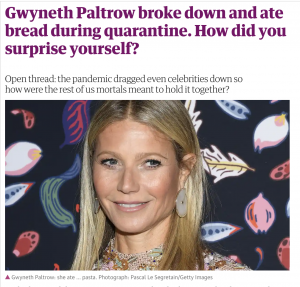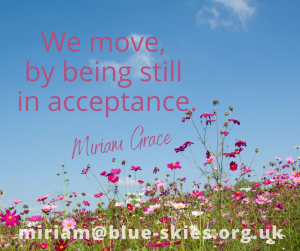 Click the picture for the full Guardian article!
Click the picture for the full Guardian article!
Oh Gwyneth! What were you thinking! Ha ha
Why is it so hard to do the right thing when it comes to losing weight?
This is a question that so many of my clients have asked me and this is a partial answer that has taken me a long time to arrive at.
It is a an essential part of our ‘wiring’ to survive. Often in therapy we are working with trying to unhook certain behaviours from our fight / flight response. Trying to re-educate our systems, for example, that the world won’t end if we feel proud of an achievement or express love for someone. But it’s not as simple as discussing the logic of a thought to then change behaviour.
If it were that easy people would think themselves out of depression, low self-esteem, addiction, avoidance and anxiety. Processing things cognitively is not enough when behaviours are hardwired or rooted in a precognitive or fight / flight brain. The brain becomes more cognitive after about age 7. A lot of our survival mechanisms happen in the pre-cognitive years and even the pre-verbal years. (Think of crossing the road, or being careful going down stairs or up escalators.)
You wanted to know about losing weight, not about your fight / flight response I can hear you say! However they they are linked.

When we are under threat, when we are not safe, when we are being attacked or bullied, rejected or disliked we contract, our behaviour becomes more rigid and automatic. We are in survival mode. People in survival mode are not focused on growth, enrichment, peace, joy, happiness. They are just focused on getting by. Survival instincts are primitive and come into play when we feel under threat.
To be able to move to “higher goals“ we actually need the luxury, the privilege, of being in a safe space. Depending on our levels of privilege some people can achieve a sense of safety more easily than others. But no one with a harsh, critical inner voice will feel that safe.
Comfort eating, and some other addictions, are genuinely soothing. One of my clients made me laugh last week by her creation of ‘panic pasta’! What a great idea when her partner was in a panic, to cook a carb-heavy dish for him, a creative and intuitive response, I said.
Bullying yourself and criticising yourself will increase your need for soothing. So will living through a pandemic or other difficult issues in your life. Weight gain is a visual reminder of what a hard time you’ve had, and how you did your best to get through.
It’s also not as big a deal as society makes it out to be. The pressures to make our size, our BMI, our appearance, a focus is quite honestly superficial. I would even go as far to say it’s a conspiracy inviting us to dumb down.
Life is beautiful, expansive and creative and so are we, so please don’t let yourself lose focus of the important things, your appearance is not as important as you have been trained to think! However, some of us want to make healthier choices around things like our blood pressure, our fitness and our capacity to tie our shoe laces and we want to take pressure off our joints.
Maybe now you don’t want to have the visual residue of the past stresses on your body. Going out into the world after the pandemic makes us all suddenly self conscious as we become aware of how we look to others and concerned about how we may be viewed (if you can’t relate to weight gain can you relate to greying hair?). The hard times may be on the the way out now, so you’re ready for those extra pounds to leave too. As you look forward, how can you deal with the past still hugging around your hips?
Step One – remove the bullies; Step Two – increase the soothing in other forms; Step Three – pre-empt the need for soothing; Step Four – make good choices easily.
Step one – remove the bullies
Your system may have been over aroused and hyper-vigilant for many years so patience is necessary to switch this alarm system off. When you are safe, then your cognitive function improves and comes online. When you are safe food is just food, hunger is just hunger, it is no longer threat and safety, loneliness and comfort.
With all sorts of healing, and certainly when you are struggling with behavioural change, forget change. Focus on soothing your nervous system. This will enable a much easier behavioural change. If you’re in survival mode with a high alert it’s like trying to drive with the brakes on.
it’s like trying to drive with the brakes on
Please be kind. Not just kind but truly compassionate and loving. I’m sure you’d say to a friend that weight loss is not the most important thing when you’ve been through trauma. This is true for you too. You did your best, you coped, you survived, you soothed yourself and it’s OK. You’re not bad, you’re not weak, you were in survival mode and this wasn’t a priority.
You need to deal with the trauma first, switch off the alarm system. Take your time, you may not want to start weight loss right now, maybe that’s why it is ‘not working’, your system is still holding on and it’s too soon. Stressed systems may hold onto all the calories it can in survival mode. In my own experience it can take a long time for a nervous system to relax, so make that your focus.
Step Two – increase the soothing in other forms

Rather than eliminate and deprive yourself, start by expanding soothing options. Engage in yoga, meditation, bubble baths, reading a book in the sunshine, phoning a friend. When you feel relaxed, engage your observing ego – this is the part of you that notices you are relaxed. Notice how it feels in your body most of all but notice too your self talk and how this is different when you are feeling safe. Enhance this experience by saying to yourself something like, “I am safe and secure” “I am serene and calm”. If you can give and receive safe touch. This extra noticing helps you to remember what safety and relaxation feels like and will help your system to recognise it and return to it.
See also my Body-Mind Workshop – is this something appropriate for you to attend and practise some of the methods we will be using?
Step Three – pre-empt the need for soothing
Find out more about the true need under your behaviour (are you looking for love, safety, stimulation?). It feels as if you need food but you want it rather than need it. Self awareness gained through therapy or meditation practice can lead to you finding the true need (we do a lot of this on my Nourish and Nurture training). Sometimes the true need is really easy to meet, other times we have the tough job of facing the experience of an unmet, and maybe never to be met, need. However this is rarely anything like as tough as the consequences of not knowing about the true need and mistakenly attempting to meet it through addictive processes.
Another way of reducing the need for soothing is to think about what you expose yourself to in the way of stress. Where are you spending your time? How relaxed and safe does your body feel in those spaces? For how many hours a day? Think about your home life, your work life, your social life. Do you feel more relaxed as a result of being in those environments or less relaxed? What might this mean for you? Is it worth being stressed? What are your priorities?

Step Four – make good choices easily.
Register that you have survived. Then you’ll be able to apply logic to your behaviours and find that, with a lot less effort than you thought, you can now make the link between soothing and caring, and not comfort eating.
When you feel safe and have done the hard work of soothing an over aroused nervous system the choices become easy. It’s simple to consult with your inner voice and to remember your long term goals, your desired outcomes, when you’re not stressed. Your system isn’t hyper-aroused so is less likely to perceive hunger as a threat or as something distressing that needs to be soothed. You just have to make choices around food that will help you and food that won’t help you, not deal with whether you will survive, whether you feel bad, whether you’re loveable, whether you’re lonely. Because you’ve done the hard work already, unhooking some of the psychological issues that have become entangled in your process, this will seem easy in comparison. You can approach it in a happy and relaxed fashion. You can also let it become appropriately, less of a thing. It matters, yes, but not that much.
you just have to make choices around food that will help you and food that won’t help you, not deal with whether you will survive, whether you feel bad, whether you’re loveable, whether you’re lonely
For those of you who have been part of my Nourish and Nurture group over the winter months, this makes sense in the analogies we used:
The Captain, in the middle of the gale with 30 foot waves, isn’t going to be focussed on the destination at that point, or on the solid presence of the Wise Woman, she is going to focussed on keeping the ship afloat. After the storm, she will turn her thoughts to navigation, direction and course setting once more.
(If you’d like to be part of this women’s wintering group 2021 – 2022 have a look at my groups page.)
If unwanted weight gain is not an issue for you, think of something that IS hard for you to make good choices about? In what way could soothing the nervous system make sense as Step One for you? It is now thought that our fight / flight survival responses may be formed during the period of our birth. It doesn’t seem fair or sensible to blame yourself for your survival programming.
Open to all those who work with others in a helping / healing relationship, whether mind based or body based work (eg yoga teachers, counsellors, reflexologists, psychologists) my upcoming Body-Mind Workshop with Imogen Ragone will give YOU some experience of good techniques for tweaking your system to register a sense of inner safety. Why not take a look here: THE EMOTIONAL BODY CPD WORKSHOP ?
This article is is not written in response to addictions* to alcohol or drugs or for eating disorders.
In these cases, ALWAYS apply Step One, but along with seeking medical help.
*addiction is a different problem to ‘addictive’ or habitual process / behaviours